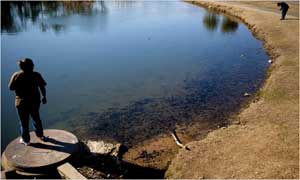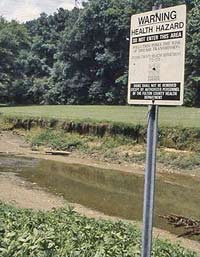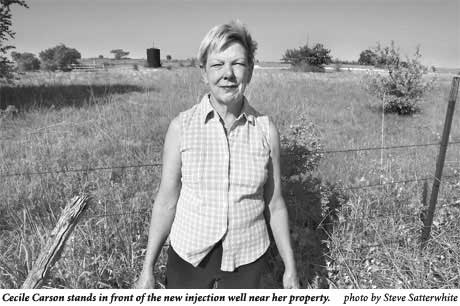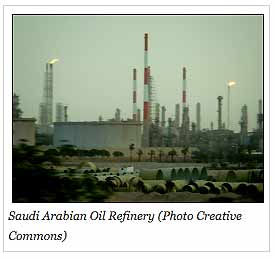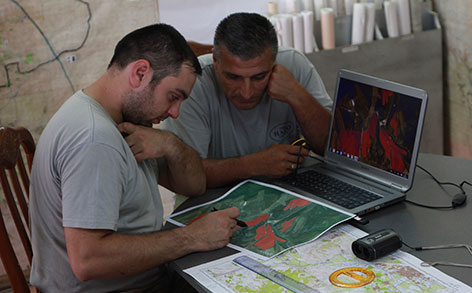Press
Thousands of the nation’s largest water polluters are outside the Clean Water Act’s reach because the Supreme Court has left uncertain which waterways are protected by that law, according to interviews with regulators.
As a result, some businesses are declaring that the law no longer applies to them. And pollution rates are rising.
Companies that have spilled oil, carcinogens and dangerous bacteria into lakes, rivers and other waters are not being prosecuted, according to Environmental Protection Agency regulators working on those cases, who estimate that more than 1,500 major pollution investigations have been discontinued or shelved in the last four years.
The Clean Water Act was intended to end dangerous water pollution by regulating every major polluter. But today, regulators may be unable to prosecute as many as half of the nation’s largest known polluters because officials lack jurisdiction or because proving jurisdiction would be overwhelmingly difficult or time consuming, according to midlevel officials.
“We are, in essence, shutting down our Clean Water programs in some states,” said Douglas F. Mundrick, an E.P.A. lawyer in Atlanta. “This is a huge step backward. When companies figure out the cops can’t operate, they start remembering how much cheaper it is to just dump stuff in a nearby creek.”

See: PBS Frontline: "Poisoned Waters"
See Video report: "Supreme Court Restricts Clean Water Act". | Mixplex
See: Kid's view of a local water-quality problem
Students in the Atlanta and Columbus, Ga. area formed The River Kids Network, which tests and cleans up local streams (wearing gloves and boots, of course). Is there an organization in your area that does similar work?
Here are some 3rd graders' observations during a recent creek cleanup:
Not safe, even for bugs
"It's not looking so good. Raw sewage is in the Chattahoochee River, and not many critters can survive there. If bugs can't survive in there, what are humans going to do?"
Just a little effort
"I would just like the river to be clean enough so I could splash around and maybe drink some water. It wouldn't be very hard to make a difference."
Had it up to here
"The problem is that there are sewage leaks going to the creek and the creek goes into the big river. Everyone should help. If everyone helped, you could see right down to the bottom of the creek."
Out from under cover
"I want to play in the creek and not have to wear gloves and boots."
Signs of life are few
"On our monthly trips, we've found a lot of trash, including more than 18 tires, a radio, shoes and plastic bags. We've only found a few forms of life. We saw one turtle and a few bugs, but not many fish."
Jane Park.
Interview with blogger Elizabeth Berkowitz.
Cindy Kalbach and her husband have lived in Gaines for 10 years, enjoying the quiet wilderness. But that's become a lot harder because of increasing drilling activity. With wells as close as a mile away, trucks from gas companies are ravaging their roads, kicking up dust, driving away wildlife and keeping the Kalbachs indoors. Kalbach refuses to lease her land to gas companies, but some of her neighbors haven't been able to resist the offers. People around here are very low income. They just want to live here in peace, you know? And that's a lot of money to them. they don't realize what they're getting into,said Kalbach. Kalbach took her concerns to Elizabeth Berkowitz, an avid blogger who started Faces of Frackland to give a voice to people who feel like no one is listening.
WASHINGTON COUNTY, PA - At first, farmer Ron Gulla and horse farm owner Joyce Mitchell were excited about the prospect of making money from gas drilling. Now, after more than two years of the presence of drilling companies with their heavy trucks and huge drill rigs, they and many of their neighbors wish they had never signed a lease.
Gasses bubbling out of the ground and into drinking wells and ponds. Before drilling is begun, a landowner should have the water tested for baseline items, he said. “The only problem is that such tests can be very costly.”
Cecile Carson's property has an aura of rural homeyness. The neat yard, happy dogs, and blooming flowers along her fence rails suggest a love of place.
She's a high school art teacher who picked a little swath of Wise County near the small town of Decatur, about 35 miles north of Fort Worth, to settle down. She lived in a travel trailer for the first three years while she designed and built her home. The place is well thought out—its colors blend with the surrounding landscape of green, rolling hills.
It took Carson 10 years to get to this point. But it took the Railroad Commission of Texas about 45 seconds to put it all in jeopardy. On April 11, at an administrative hearing in Austin, it took less than a minute for a public reading of Carson's and her neighbor's protests against the placement of an oilfield waste injection well just a few hundred feet from their property.
Then the three commissioners immediately voted "denied" without discussion...
...Part of the commission's enforcement problem is a lack of effective penalties. After the commission field staff goes through an elaborate protocol of voluntary compliance with an offending operator, the inspector must dot every "i" and cross every "t" in order to file a legal enforcement package that will, at most, result in a fine of between $500 and $3,500.
AUSTIN — Democratic gubernatorial nominee Bill White earned more than $2.6 million serving on the board of a gas well servicing company that now is part of a congressional investigation into possible groundwater contamination.
White, who made cleaning Houston's polluted air a hallmark of his tenure as Houston's mayor, has been on the board of BJ Services Co. since 2003, the year he was elected, earning more than $627,000.
White also received almost $830,000 in stock and another $245,000 in stock options. He will receive an additional $180,000 in stock and a retirement payout of $783,000 if the firm's merger with Baker Hughes is approved by shareholders Friday.
The issue of White's involvement with BJ Services came to light after he refused a Houston Chronicle request for his tax returns during his tenure as mayor. The relationship was disclosed in personal financial disclosure statements. White's campaign provided details on his BJ Services earnings Tuesday.
The U.S. House Energy and Commerce Committee is investigating Houston-based BJ Services Co., Halliburton and several other oil field service companies to see if the gas extraction method known as hydraulic fracturing, or fracking, is a hazard to groundwater drinking supplies in Texas, Arkansas, Colorado, New York, Oklahoma and Pennsylvania.
Wikileaks has embarrassed the U.S. and a member of the House Homeland Security Committe, Candice Miller (R-Mich) has said, "It is time that the Obama administration treats WikiLeaks for what it is — a terrorist organization whose continued operation threatens our security."
I propose that this story about peak oil is a leak fed by the U.S. to drive up the price of oil in the long term.
It is the effect of oil consumption on our environment, not our economy, that is best considered around our mashup meanderings of this story. The toll that greenhouse gases are taking on human health and climate change has, by some accounts, already killed millions of children worldwide. Even is there were an endless supply, burning oil and gas has serious health effects and while scientists and economists trade models, the innocent suffer outside the lens of for-profit media. (Neil Zusman, 2011-02-19).
This report about a Guardian article by Anneneberg | USC introduces us to a lively source of student journalism.
The world may run out of fossil fuels far earlier than expected and experience a climb in the price of oil, as data in newly leaked WikiLeaks cables suggest that Saudi Arabia has fewer oil reserves than previously believed.
The latest confidential cables to be released come from the American embassy in Saudi Arabian capital Riyadh, and claim that Saudi oil reserves were overstated by as many as 300 billion barrels, or nearly 40 percent of its actual reserves.
The former head of exploration at Saudi oil monopoly Aramco, Sadad al-Husseini, stated in the classified cables that “peak oil” – the point at which global production and, thus, consumption of oil reaches its highest possible level – may come as early as 2012.
Read between the lines, see these links on Fracking Resources Guide:
Climate Co-benefits and Child Mortality Wedges | Fracking Resource Guide.
The Deep Hot Biosphere : The Myth of Fossil Fuels
Probe Earth's Interior with Advanced Radiation Sources
Center for Dark Energy Biosphere Investigations (C-DEBI)
See: Appelbaum, Binyamin. “A Life’s Value May Depend on the Agency, but It’s Rising.” The New York Times 16 Feb. 2011. Web. 17 Feb. 2011.
See also: Associated Press. "How to value life? EPA devalues its estimate: $900,000 taken off in what critics say is way to weaken pollution rules." 2008-07-10.
Google and a New York financial firm have each agreed to invest heavily in a proposed $5 billion transmission backbone for future offshore wind farms along the Atlantic Seaboard that could ultimately transform the region’s electrical map.
The 350-mile underwater spine, which could remove some critical obstacles to wind power development, has stirred excitement among investors, government officials and environmentalists who have been briefed on it.
The system’s backbone cable, with a capacity of 6,000 megawatts, equal to the output of five large nuclear reactors, would run in shallow trenches on the seabed in federal waters 15 to 20 miles offshore, from northern New Jersey to Norfolk, Va. The notion would be to harvest energy from turbines in an area where the wind is strong but the hulking towers would barely be visible.
See: Plug into a Greener Grid: RE<C
Google.org is working towards a clean energy future in a variety of ways: We're working on developing utility scale renewable energy cheaper than coal (RE<C) and accelerating the commercialization of plug-in vehicles through the RechargeIT project. Our over-arching vision is to one day transform the global economy from one running on fossil fuels to one largely based on clean energy. Our Clean Energy 2030 plan offers a potential path to do just that.
Google Earth platform to simplify siting of clean energy
See: Google Earth Outreach Showcase
See: Appalachian Voices My Connection
See: Appalachian Mountaintop Removal Tour
See: Marsh Fork Elementary: Journey Up Coal River | A Community and Strip Mining
See: Mountaintop Removal (Film)
See: Tree spiker : from Earth First! to lowbagging: my struggles in radical environmental action
See: Bluedaze. Mountain Top Removal for Hydraulic Fracturing Sand
Workers at a steel mill and a power plant were the first to notice something strange about the Monongahela River last summer. The water that U.S. Steel and Allegheny Energy used to power their plants contained so much salty sediment that it was corroding their machinery. Nearby residents saw something odd, too. Dishwashers were malfunctioning, and plates were coming out with spots that couldn’t easily be rinsed off.
See: Nicholas Kusnetz. "Pennsylvania’s Drilling Wastewater Released to Streams, Some Unaccounted For." ProPublica. Jan. 5, 2011.
See: West Virginia Blue: Dunkard Creek fish kill
See: The Tragedy of the Commons
See: Do the natural gas industry’s surface water withdrawals pose a health risk?
See: Center for Healthy Environments & Communities Homepage
See: The Case for a Truth and Reconciliation Commission on Toxic Hazards
See: Drilling Wastewater Disposal Options in N.Y. Report Have Problems of Their Own - ProPublica
See: Lenape Resources, Inc. | Underground Injection of Wastewater
See: Rulings Restrict Clean Water Act, Foiling E.P.A.
See: Activists Block Entrance to DEP Headquarters, Condemn Failed Enforcement
See: Flow - The War Between Public Health and Private Interests






